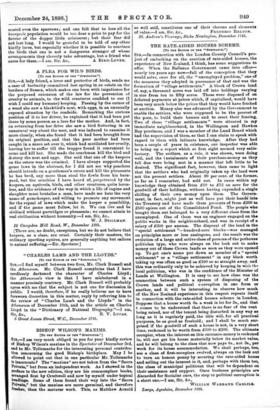A PLEA FOR WILD BIRDS.
[To THE EDITOR OF THE "Sricc-razore."] SIE,—A lady friend, a lover and protector of birds, sends me a case of barbarity committed last spring in an estate on the borders of Sussex, which makes one burn with impatience for the proposed extension of the law for the prevention of cruelty to animals, to the wild creatures confided to our (I wish I could say humane) keeping. Passing by the corner of a wood she saw a blackbird's nest, with eggs, in an unusually exposed situation by the roadside. Remarking the carious position of it to her driver, he explained that it had been put there by some person as a lure for the mother. And, in fact, on returning from her drive she saw a bird fluttering in an unnatural way about the nest, and was induced to examine it more closely, when she found that it had been brought from its original position, and that the poor mother had been caught in a snare set over it, which had mutilated her cruelly, leaving her to suffer till the trapper found it convenient to come and kill her. She made the coachman kill the bird and destroy the nest and eggs. She said that one of the keepers on the estate was the criminal. I have always supported the game laws in the abstract, for I did not see why poachers should intrude on a gentleman's estate and kill the pheasants he has bred, any more than steal the fowls from his barn- yard, but the cruelties I have heard of, perpetrated by the keepers, on squirrels, birds, and other creatures, quite harm- less, and the evidence of the way in which a life of rapine and slaughter must brutalise a man, have made me hate the very name of gamekeeper, and willing to promote any movement for the repeal of laws which make the keeper a possibility, and if the game must follow, let it. We can live and be civilised without partridges or pheasants; we cannot attain to real civilisation without humanity.—I am, Sir, Ste., {There are, no doubt, exceptions, but we do not believe that keepers, as a class, are cruel. Certainly their masters, the ordinary sporting squires, are generally anything but callous to animal suffering.—En. Spectator.]






































 Previous page
Previous page